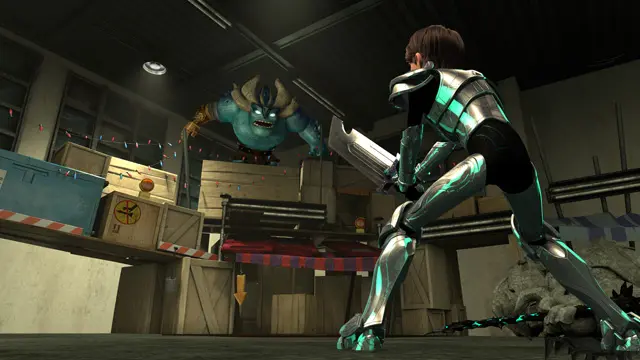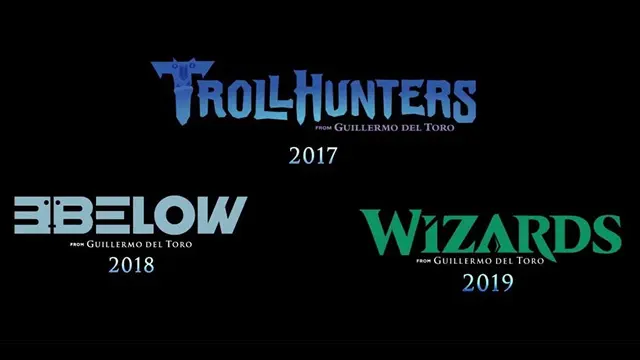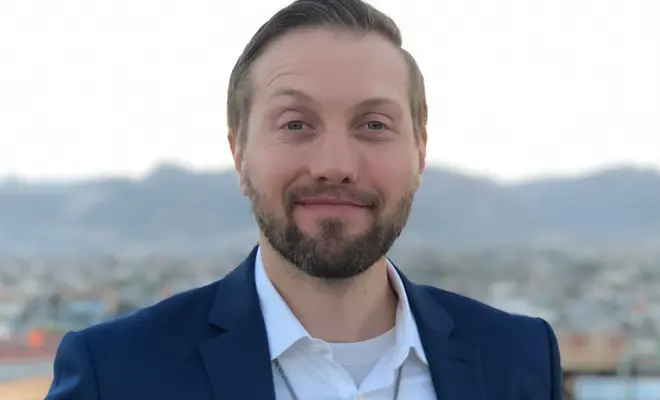The saying “from rags to riches” is as familiar to the ear as it is magnetizing to those who love its stories.
All great stories aren’t defined by financial success. Just ask Aaron Waltke; someone whose life fits more snugly into a “from corn to comedy” mold than dollars and cents.
Aaron is am Emmy Award-winning rising star in the entertainment writing world with credits including Trollhunters, LEGO’s Unikitty! series, and the upcoming Wizards conclusion to Guillermo del Toro’s expansive Tales of Arcadia universe on Netflix.
Despite his success, there was no father in show business for Aaron to lean on and ride the coattails of. He grew up about as far away from lights, camera and action as someone possibly can. And yet, through perseverance and taking chances, he turned his dreams into reality.
I thew some questions Aaron’s way about his journey, his work, his influences, and yes– Wizards. At the very least Aaron’s story should provide a little inspiration for those chasing their dreams against the odds.
You grew up in Indiana, more than a stone’s throw away from Los Angeles. At what point in your childhood did you decide you wanted to pursue writing as a career, or did that come later after you were already in Los Angeles?
I was raised in the farmland suburbs just outside of Indianapolis– my childhood home was literally between two cornfields. In the late 80’s and early 90’s, we didn’t have cable TV and the best the Internet had to offer was a dial-up connection to AOL chat rooms. As such, there wasn’t much for my friends and I entertainment-wise, so we were forced to invent our own. We’d have endless debates about whether The Predator could beat a T-1000, or if Earth existed in the Star Wars universe.

Eventually, we started making movies with my parents’ camcorder, to the delight and mystification of the adults and teachers around us. When I entered college, I found few things brought me as much joy as storytelling, so I decided to make a go of it as a career. While studying English, telecommunications, theater and film theory, I was constantly making short films in my off-hours, and writing and performing sketch comedy for not-entirely-sober college students around Indiana University.
After I graduated, I worked in documentary filmmaking at PBS for a bit, and then a few of my fellow Hoosiers decided to make the leap to Los Angeles together. Once here, we set up shop essentially doing the same thing– performing sketch comedy, making short films, and generally refusing to be adults.
What was your first paying entertainment gig after moving west? And did you consider it your big break?
My first paying gig here in Los Angeles was at National Lampoon, the production company most famous for producing Animal House, the Chevy Chase Vacation movies, and the sketch group Lemmings who went on to be the premiere cast of SNL. I was hired as a writer/producer/editor to produce content for a newfangled thing called YouTube, which no one had any idea how to make money off of yet. We managed to make a few videos that went viral, and also got into producing programming for National Lampoon College TV, a two hour block of shows that aired at 300+ universities across America.
I’m not sure I would call it my “big break”, but it certainly was a fantastic (and tremendously weird) first job here in Los Angeles. It was an incredible chance to work alongside many wonderful and very talented people who have gone on to have successful careers in their own right. It was also nice to have a job at all– I moved out shortly before the Recession, which was a hard time here in Hollywood. I managed to hang onto my crazy internet comedy job through those tumultuous times, and it primed me to become a better writer for a larger audience along the way.
How does the approach for writing and developing stories for Unikitty! differ from say Trollhunters?
The two shows are certainly very different beasts– Unikitty! is episodic, silly chaos with an emphasis on wild left turns and comic unpredictability, while Trollhunters (and the greater Tales of Arcadia franchise) is heavily serialized action-adventure with an emphasis on unraveling big mythology alongside character. But in the end, story is story. Sometimes you’ll hear that comedy and action are two different skill sets, but I genuinely believe that both exist on the same spectrum. The best action has moments of lightheartedness and laugh-out-loud levity (just look at the Marvel Cinematic Universe!) while the best comedy has a genuine sense of stakes and danger that at least feel big, even if it’s something as mundane as “We have to pass Señor Uhl’s mid-terms, or we’re totally doomed!”
How did you end up on the Trollhunters writing team with the Hageman Brothers, A.C. Bradley and others?
At the time, I had an original sample I’d written with my good friend Chad Quandt, with whom I’d collaborated on a few projects over the years alongside our solo projects. Prior to Trollhunters, we’d written on web series for Mondo Media (of Happy Tree Friends fame) and a couple of animated feature films that were in development. Eventually, one of our scripts found its way over to DreamWorks Animation– the studio had just signed a huge deal with Netflix to produce thirteen animated shows, which was completely unheard of. One of those was the Guillermo del Toro project Trollhunters. Rodrigo Blaas and the Hageman brothers loved our sample, so they brought us in to be a part of a very small writers’ room for the series, which until then was being developed as a feature film by Rodrigo, Marc Guggenheim and others under Guillermo’s producing eye. Everyone in that room and on the crew was (and is) extraordinarily brilliant at what they do. Guillermo called it a “special alchemy”– one that’s almost impossible to plan but wonderful to experience firsthand. All of us brought something to the table, and I’ll always be tremendously grateful for the opportunity to work alongside them.

At what point during the process of developing Trollhunters and Tales of Arcadia did you realize something special was happening?
This is going to sound strange, but shortly after the initial few animatics were locked, we started to get some animated test shots, our first glimpse of what the show would look like. It was an unassuming closeup of a tomato on a cutting board. I remember all of us gathering around the laptop and gasping at how beautiful it was. Sure, it was just a fruit and some cutlery, but it was so richly lit and textured right down to the imperfections in the woodgrain– we all suddenly realized we were doing something truly unprecedented. As more came in and the show grew and flourished, we felt it was on our shoulders to live up to the potential of the series and always make it as bold, inventive and wonderful as we could.
I asked the Hageman Brothers this question and it’s fitting for you as well: what’s the biggest takeaway you recall from working with the legendary Guillermo del Toro?
It’s difficult to sum up everything I’ve learned, but a few takeaways I always keep in mind are… Take big swings and never settle for platitudes. Always the emotion is just as truthful, if not moreso, than the logic. The plot should be the rhythm, but the story is the melody. And as Guillermo is often fond of saying, “the ambitions should always exceed the budget.” That’s not to say you should break the bank all the time, but the hallmark of Team Trollhunters has always been to evoke something often thought to be difficult or impossible by technology or time restraints, then use every ounce of creativity to find a way to achieve it within our limitations. As such, we were able to push the storytelling– in the writing, in the visuals and designs, in the editing, even sound design– to go crazy places many thought we couldn’t before.
Your career trajectory is not confined by writing. Not only are you a head writer on Wizards, the final chapter in Tales of Arcadia, but also a co-executive producer and co-showrunner as well. How were you able to make that transition from writing to showrunning?
As with many jobs, promotions often mean more work and more responsibility. But ultimately, the fundamentals of being a writer remain the same at all levels– tell a good story. And oftentimes, that means surrounding yourself with the most talented people you know, and all of you tackling the impossible together. Tales of Arcadia is a team sport, and we all take turns standing on the shoulders of giants. Steel sharpens steel, and oftentimes it’s finding a way to navigate the challenges of production to make sure there’s a place for everyone’s creativity to shine, and to enhance what came before in the process, from the script on it’s long journey to the screen.
Without spoilers obviously, what can we expect tonally from Wizards in comparison to Trollhunters and 3Below befo
Sadly, there isn’t much I’m allowed to say about it, other than I’m beyond excited for you all to see it. If you like the Tales of Arcadia so far, you’ll love Wizards, and the story goes some surprising places…
Streaming has been disrupting the small screen format for years and created countless more opportunities for storytelling than ever before. Do you consider now a golden age for serial stories on television?
I’m of the opinion that more competition and platforms will only benefit artists, by providing more venues to tell a greater variety of stories– and few take as many bold risks as streaming services, which is their biggest strength. Television animation is certainly going through a kind of Renaissance in terms of the sheer amount of good content, the likes of which I haven’t seen since the days of Saturday morning and Disney afternoon. I also believe that audiences are incredibly smart and astute when it comes to following a narrative, and streaming lends itself to serialized content more than anything that’s come before it (short of, say, the DVD boxed set.)
There will likely be a time when the disruption causes so much shakeup that the traditional models of how audiences are found for a TV series will need to be revised. We are already experiencing some of that. But even if it’s projected in a holo-crystal or beamed directly into their pre-frontal cortexes, the format doesn’t matter– humans will always want to be told tales around the campfire.
What is your dream project to work on if a genie granted you that wish? Would it be animation or live-action?
I’m always terrible with these sorts of questions, but if you told me I get to write a Back to the Future, Ghostbusters, or Indiana Jones, I would probably pay you a significant sum just for giving me the good news. I’m an unapologetic Amblin guy. All of my favorite films were made by Spielberg or Cameron or Lucas or their associates back in the 80s and 90s.

You’ve begun to inspire young writers including the “Epic Storytelling in Modern Television” panel at RESET 2018. Is imparting your experience something you’re looking to do more of in the future?
There’s been a few times I’ve been told I have a professorial approach in the writers’ room– for better or worse– so deconstructing what makes a good tale and opening it up for discussion is always a fantastic way to figure out why stories work or don’t, at least for me. Whenever I’ve had the chance to speak to students or at seminars, it’s always a rewarding experience for both of myself and the students, because I get the chance to impart some of the hard-won wisdom I wish I’d had when I was first starting out. I genuinely believe the best thing creative professionals can do is reach down and help others up. It’s not always easy or possible, but you try. Rising tides raise all ships.
My son is only 11 but for at least the last 3 years his sole passion has been writing stories/comics with original characters in what are now over a hundred notebooks that litter our house. What advice would you give to him and scores of other young aspiring writers out there?
Just keep creating. Try to make each one a little better using what you learned from the last. Show them to other people and collaborate. Find your heroes and decide why they’re your heroes. Figure out what you want to say about the world, and cling to that tightly– everything you write will be a reflection of what you believe, over and over again, even if your characters don’t understand it yet. And don’t give up if you face rejection– you’ll hear more than a few “No’s” over the course of your career, but it only takes one “Yes.”
Has Wizards wrapped, and if so, can you give us a hint of what’s next on your plate?
Wizards is still in production. I have a few cool projects on the horizon that I’m not quite allowed to talk about yet. But stay tuned!
And last and probably least, are these the kind of shenanigans that occur in a writers room (Aaron is in the background)?
Long show. Gotta make it fun. #DaytimeEmmys @GoodAaron pic.twitter.com/Z6YUNDs1Ll
— Dan & Kevin Hageman (@brothershageman) May 4, 2019
Constantly. It’s hard not to lose your mind when a bunch of smart people are trapped in a tiny space together thinking about magic and monsters for months at a time. But you compensate with toys. And YouTube videos. And snacks. And Friday beers.
You can follow Aaron on Twitter to see what’s next up his sleeve.



